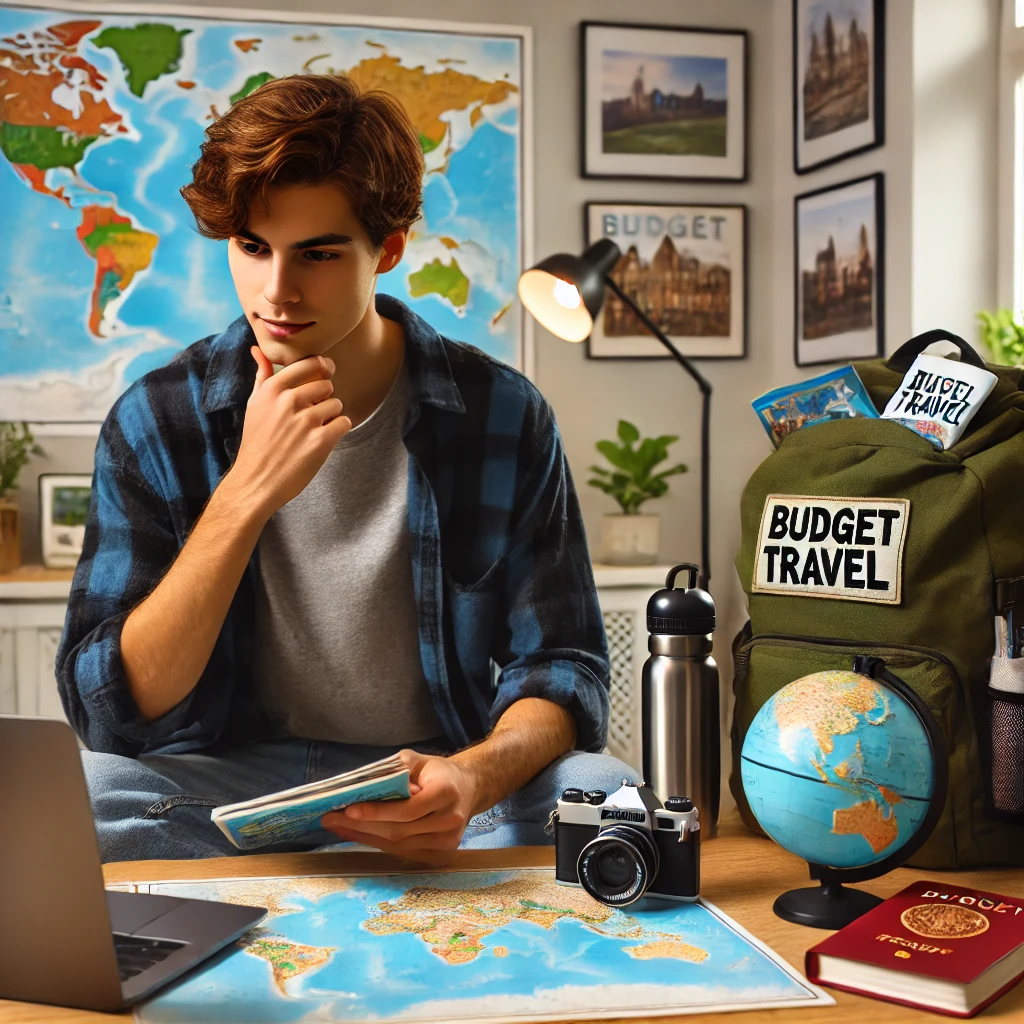Introduction
Traveling doesn’t have to be expensive to be enjoyable and fulfilling. Embracing budget travel allows for more authentic experiences, longer trips, and financial peace of mind. This article will provide essential tips and strategies on how to travel on a budget, covering everything from finding affordable flights and accommodations to saving money on food and activities. Learn how to make the most of every travel dollar, ensuring memorable adventures without breaking the bank.
Why Travel on a Budget?
Traveling on a budget offers a multitude of advantages that go beyond just saving money. One of the most significant benefits is the opportunity for more authentic experiences. When traveling on a budget, there is often a greater emphasis on immersing oneself in the local culture. This can involve staying in locally-owned accommodations, eating at neighborhood restaurants, and participating in community activities, all of which provide a deeper understanding of the destination.
In addition to cultural enrichment, budget travel makes it possible to extend the duration of trips. With careful planning and cost-saving strategies, the same budget that might fund a short luxury vacation could instead support a longer journey. This extended time allows for more exploration, relaxation, and a fuller appreciation of the travel experience. The flexibility to travel longer also opens up the possibility of visiting multiple destinations, turning a single trip into a grand adventure.
Financially, budget travel ensures that adventures do not lead to financial strain. By spending wisely and prioritizing experiences over expenses, travelers can enjoy their trips without the stress of overspending. This mindful approach to travel budgeting encourages a sustainable travel lifestyle, making it feasible to embark on more frequent trips. Whether it’s finding affordable flights, opting for budget-friendly accommodations, or discovering free or low-cost activities, the strategies of budget travel help in maximizing enjoyment while keeping finances in check.
Planning Your Budget Trip
Research and Planning
Effective research and planning are the cornerstones of any successful budget trip. Start by setting a clear budget. This involves determining how much can be spent overall and then breaking down expenses into categories such as flights, accommodation, food, and activities. Establishing a budget helps in making informed decisions and prevents overspending.
Next, choose budget-friendly destinations. Certain places offer more value for money, with lower costs for lodging, meals, and attractions. Southeast Asia, Eastern Europe, and parts of South America are known for being particularly affordable for travelers. Research destinations that fit within the budget and offer the experiences sought.
Timing is everything when it comes to budget travel. Traveling during the off-season can lead to significant savings on flights, accommodation, and even some attractions. Off-season travel means fewer crowds and a more relaxed experience. Research the peak seasons of potential destinations and aim to travel just before or after these times to take advantage of lower prices.
Finding Affordable Flights
Securing affordable flights is crucial for budget travel. One of the best ways to find cheap flights is by using flight comparison websites such as Skyscanner, Google Flights, and Momondo. These platforms aggregate flight options from various airlines, allowing for easy comparison of prices and routes.
Flexibility with travel dates and destinations can lead to significant savings. Sometimes, flying a day earlier or later than planned can result in lower fares. Additionally, being open to different destinations can uncover unexpected deals. Set fare alerts on comparison websites to get notified of price drops for desired routes.
Consider flying into alternative airports. Major cities often have multiple airports, and sometimes flying into a secondary airport can be cheaper. Research all possible airports near the intended destination and compare the costs. Additionally, factor in the cost and convenience of transportation from the airport to the final destination.
Saving on Accommodation
Affordable Lodging Options
Finding budget-friendly accommodation is a key aspect of traveling on a budget. Hostels and guesthouses are excellent choices for budget-conscious travelers. Hostels, in particular, offer affordable rates and a social atmosphere, making them perfect for solo travelers or those looking to meet new people. Guesthouses often provide a more personal touch and can be found in a wide range of prices and styles to suit different preferences.
Vacation rentals and Airbnb can be cost-effective, especially for groups or longer stays. These options often come with amenities like kitchens, allowing travelers to save money by preparing their own meals. Vacation rentals can also provide more space and privacy compared to traditional hotels, enhancing the overall travel experience.
House sitting and Couchsurfing are fantastic ways to secure free or very low-cost accommodation. House sitting involves taking care of someone’s home (and sometimes pets) while they are away, which can be a mutually beneficial arrangement. Couchsurfing connects travelers with locals who offer a free place to stay, providing a unique cultural exchange and a chance to make new friends around the world.
Booking Strategies
Employing smart booking strategies can significantly reduce accommodation costs. One effective approach is to book early or last-minute. Booking well in advance often secures the best rates, as many accommodations offer early-bird discounts. Conversely, some places drop prices at the last minute to fill remaining rooms, presenting opportunities for spontaneous travelers to snag great deals.
Using loyalty programs is another excellent way to save on accommodation. Many hotel chains and booking platforms offer rewards programs that allow travelers to earn points with each stay. These points can be redeemed for discounts, free nights, or other perks, adding up to substantial savings over time.
Staying outside the city center can also be a major money-saver. Accommodations in central locations tend to be more expensive, while those in surrounding neighborhoods often offer better rates. Public transportation or ridesharing can make it easy to access main attractions without the hefty price tag of staying in the heart of the city.
Eating on a Budget
Dining Tips
Eat Like a Local
One of the best ways to save money while traveling is to eat like a local. Street food and local markets often offer delicious, authentic meals at a fraction of the price of tourist-oriented restaurants. Not only does this strategy keep costs down, but it also provides an opportunity to experience the local cuisine and culture more authentically. Seek out food stalls, small eateries, and farmers’ markets where locals dine to find the best deals and flavors.
Cook Your Own Meals
If your accommodation includes kitchen facilities, take advantage of them to cook your own meals. Preparing breakfast, lunch, or dinner can significantly reduce daily food expenses. Visit local grocery stores or markets to buy fresh, affordable ingredients. Cooking your own meals not only saves money but also allows for healthier eating habits and the convenience of dining at your own pace. Even simple meals like sandwiches, salads, and pasta can be both economical and satisfying.
Look for Meal Deals and Happy Hours
Many restaurants and bars offer meal deals, happy hour specials, and discounts at certain times of the day. Research local dining spots that provide lunchtime specials, set menus, or early bird discounts. These deals often include a full meal at a reduced price, making it possible to enjoy dining out without overspending. Happy hours typically feature discounted drinks and appetizers, perfect for a budget-friendly evening out. Plan your meals around these promotions to maximize savings while still enjoying the local dining scene.
Transportation Savings
Getting Around Cheaply
Public Transportation
Using public transportation is one of the most effective ways to save money while traveling. Buses, trains, and subways are typically much cheaper than taxis or rental cars, and they offer a great way to experience the local way of life. Many cities offer daily or weekly passes that provide unlimited travel on public transport, further reducing costs. Research the public transportation options available at your destination and plan routes in advance to maximize efficiency and savings.
Walk or Bike
Walking or biking is not only free but also an excellent way to explore a new place. Many cities are highly walkable, with major attractions, restaurants, and shops located within close proximity. Walking allows for a more intimate exploration of the area, offering chances to discover hidden gems that might be missed when using other forms of transportation. Renting a bike is another affordable option, often costing just a few dollars per day. Many cities have bike-sharing programs that make it easy and convenient to get around on two wheels.
Ridesharing and Car Rentals
When public transportation isn’t feasible, consider ridesharing or renting a car. Ridesharing services like Uber and Lyft can be more affordable than traditional taxis, especially when traveling short distances. Additionally, carpooling with fellow travelers can split the cost of ridesharing or car rentals, making these options more budget-friendly. If renting a car is necessary, look for deals and discounts, and consider renting a smaller, more fuel-efficient vehicle to save on gas. Booking in advance and comparing prices from different rental companies can also help secure the best rates.
By utilizing these cost-effective transportation methods, travelers can significantly cut down on travel expenses while still enjoying the convenience and freedom to explore their destinations.
Budget-Friendly Activities
Enjoying Activities on a Budget
Free Attractions and Events
Exploring free attractions and events is a fantastic way to experience a destination without spending a lot of money. Many cities offer beautiful public parks, gardens, and nature trails that are open to visitors at no cost. Museums and galleries often have certain days or times when admission is free or discounted. Keep an eye out for local festivals, street performances, and community events, which provide cultural experiences and entertainment without the expense. Researching these free activities in advance can help plan a budget-friendly itinerary that is rich in experiences.
Discount Passes and Coupons
Taking advantage of discount passes and coupons can lead to significant savings on entry fees and tours. Many cities offer tourist passes that bundle multiple attractions and services for one reduced price. These passes often include public transportation, entry to popular sites, and discounts at restaurants and shops. Additionally, look for online coupons or promotional codes that can be used to lower costs on tours, activities, and dining. Websites like Groupon and local tourism boards are excellent resources for finding these deals.
DIY Tours and Exploration
Creating your own tours and exploring independently can be both cost-effective and rewarding. Instead of booking expensive guided tours, use maps, guidebooks, and travel blogs to design personalized itineraries. Walking tours, self-guided audio tours, and public transportation routes can provide an immersive way to see the sights at a fraction of the cost. Researching local history and landmarks beforehand allows for a deeper understanding and appreciation of the destination. DIY exploration offers the freedom to travel at your own pace and focus on areas of personal interest, making the experience more enjoyable and tailored to individual preferences.
By incorporating these budget-friendly activities into travel plans, it’s possible to enjoy a rich and fulfilling experience without breaking the bank. Emphasizing free attractions, leveraging discounts, and opting for self-guided exploration ensures that every adventure is both memorable and economical.
Additional Tips for Budget Travel
Money-Saving Strategies
Travel Insurance
Investing in travel insurance is a smart way to protect your trip without overspending. While it might seem like an unnecessary expense, travel insurance can save you from significant financial losses in case of unexpected events such as trip cancellations, medical emergencies, or lost luggage. Look for comprehensive yet affordable insurance plans that cover essential needs. Many insurers offer budget-friendly policies tailored to different types of travelers, ensuring you get the necessary coverage without breaking the bank. Comparing plans online and reading reviews can help you find the best value for your money.
Use a Travel Credit Card
Using a travel credit card can be an excellent way to earn rewards and avoid foreign transaction fees. Many travel credit cards offer points or miles for every dollar spent, which can be redeemed for flights, hotel stays, and other travel-related expenses. Additionally, these cards often come with perks such as travel insurance, car rental insurance, and access to airport lounges. Choosing a card with no foreign transaction fees can save you a significant amount of money on purchases made abroad. Be sure to compare different travel credit cards to find one that offers the best rewards and benefits for your travel habits.
Budget Tracking Apps
Monitoring your spending in real-time is crucial for staying within your budget while traveling. Budget tracking apps can help you keep track of expenses and ensure you don’t overspend. Apps like Mint, YNAB (You Need A Budget), and PocketGuard allow you to set budgets, categorize expenses, and receive alerts when you’re nearing your spending limits. These tools provide a clear picture of your financial situation, helping you make informed decisions and adjust your spending as needed. By keeping a close eye on your expenses, you can enjoy your trip without worrying about running out of money.
Conclusion
Traveling on a budget is not only possible but also highly rewarding, offering authentic experiences, extended trips, and financial peace of mind. By setting a budget, choosing affordable destinations, finding cheap flights, saving on accommodations, eating like a local, and utilizing budget-friendly transportation and activities, you can make the most of your travel adventures without overspending. Implement these tips on your next trip to maximize your travel experience while keeping costs down. I’d love to hear about your own budget travel experiences and tips, so please share them in the comments below!



